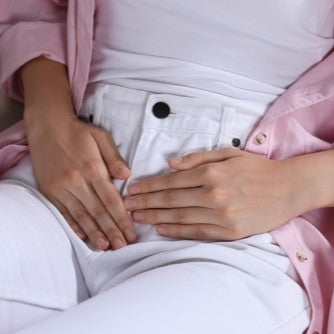There are many uncomfortable truths about menopause. One is the fact that so few of us are prepared for it—or even know about all of the many different symptoms of menopause that can flare up. And another one is how it can majorly impact your sex life.
Sexual dysfunction—having consistent issues with sexual response, desire, pain, or orgasm [1]—affects as many as 69 percent of women during menopause.[2] And even if one doesn’t have the official medical diagnosis, many women deal with frustrating sexual symptoms during the menopause transition. A 2023 survey conducted by Harris Poll for Kindra found that 41% of women age 50+ feel pain during sex. It’s no wonder that many women (including you, if you found this story) are out there asking themselves, How can I enjoy sex again after menopause?
But just because your body and life changes during the menopause transition doesn’t mean that good sex is off the table for good. Ahead, we share why sex after menopause can be painful (or just not as appealing) for so many of us, as well as some tips for menopause sex to help increase your pleasure and reduce your discomfort. The good news: There are so many solutions to help make your sex life way, way better.
Why is sex uncomfortable after menopause?
There are a few main reasons why sex is often uncomfortable after menopause. And a lot of them have to do with estrogen (or rather, lack thereof). Remember, with the menopause transition, your ovaries naturally start to make less and less estrogen until your periods officially stop. But estrogen does more than rule your menstrual cycle and impact your fertility. The all-important hormone plays a big role in many other parts of your body—and having less of it can cause some surprising changes, particularly when it comes to your sex life.
For starters, estrogen plays a key role in the health of your vagina. Low estrogen levels can make your genital area become thin and fragile [3]. Some women can even have bleeding and tearing during sex because of how sensitive their skin is. Others might experience dryness, itching, burning, stinging, or other issues that can make penetrative sex uncomfortable at best. [4]
Issues with your pelvic floor—the muscles that surround your bladder, vagina, anus, and perineum—can also put a cramp in your sex life. Weakness in these muscles, which can be worsened with age and the menopause transition, can cause pelvic pain and tightness, make sex painful (a condition called dyspareunia), and even impact your ability to orgasm. [5]
Even when you do want sex, low estrogen can make it harder to get turned on. (Rude!) According to the North American Menopause Society (NAMS), having less estrogen in your body reduces how much blood gets circulated to the vulva, clitoris, and vagina. This makes it harder to get physically aroused or produce enough lubrication—which in turn, makes sex more difficult and less enjoyable if not addressed.[6]
Many women also struggle with lower desire during menopause. Some of this can be caused directly by physical struggles. Think about it: if your body is not responding to sex as it normally would, or sex just doesn’t feel good, it’s hard to crave it! Depression and other mental health issues have been linked to desire issues for women in menopause or perimenopause [7], as have body image issues. [8]
For all of these reasons, many women may not enjoy sex during or after menopause, or may find it more frustrating than it’s worth.
Benefits of sex after menopause
Sex after menopause isn’t all doom and gloom, though. There are so many reasons why sex can be even better in this period of life—and why we at Kindra are so passionate about helping women tap back into their pleasure.
For one thing, you no longer have to worry about getting pregnant. (If you’re still in the perimenopause phase, though, please keep using protection!) Enjoyable sexual activity, whether solo [9] or with a partner [10], is also great for supporting your mental well-being. And interestingly, some research shows that staying sexually active can help reduce symptoms of vaginal atrophy.[11]
Beyond that, the potential constraints imposed by menopause might encourage you and your partner to be more creative. Maybe you find that spending more time on foreplay than before can lead to nice results. Or if vaginal penetration is too painful, you and your partner could try experimenting with your hands, fingers, and other means to tease and pleasure each other. With communication, curiosity, and a lot of lube, you might find out new things about each other to keep things exciting and fun.
How can I enjoy sex again after menopause?
Clearly, there’s a world in which menopause sex is pretty damn awesome. There are lots of treatments and solutions available over the counter to make your sexual experience full of pleasure, not pain or irritation.
What will work for you depends on the underlying issues you’re dealing with. We recommend taking the Kindra Quiz to help understand your menopause symptoms better. Once you’re ready, here are tips to help improve sex after menopause:
- For blood flow issues: Kindra MenoRelief Supplement + Crescendo 2 Vibrating Device
Support your body’s natural arousal response in the moment with the Crescendo 2. It’s a super-flexible vibrator designed to reduce pelvic pain by stimulating the pelvic floor—promoting increased blood flow to help with arousal. It’s waterproof, endlessly flexible, and with six different motors, will take you from zero to climax in no time.
Blood flow, arousal, orgasm, and libido can be complex, and can be influenced by physical, social, and emotional factors. Support your body’s sexual response with the MenoRelief Supplement, which uses Maca Root to reduce stress hormones like cortisol, and support the sex hormones responsible for the body’s ability to feel aroused and orgasm. Improved mood and better sleep are also helpful benefits for stronger libido
- For arousal issues: V Arousal Gel + Poco Vibrating Device
Can’t seem to, ahem, get it up (so to speak)? Kick-start your pleasure by adding the V Arousal Gel to your sexual routine. Just a few drops helps stimulate your nerve endings to help your body catch up to what you’re feeling—creating a warm, tingling feeling ~down there~ that is sure to keep the party going. Add on the Poco Vibrating Device to maximize your pleasure. It can be used internally or externally to stimulate your clitoris, G-spot, and other erogenous zones.
- For vulvar and vaginal dryness and painful sex: V Hydration Duo + V Lube
You’ll also want to proactively deal with your dryness, sensitivity, and discomfort outside of the bedroom—which is where our V Hydration & Relief Duo comes in. It comes with two products: one to provide healing moisture for your vulva and vagina, the other to reduce skin sensitivity (including burning, itching, and stinging).
- For pelvic floor issues: Soul Source Silicone Dilator Set
If even the thought of penetrative sex is enough to make you wince, your pelvic floor muscles might use some love. Research suggests that training the pelvic floor muscles can help reduce symptoms of painful sex and even dryness in menopausal women.[12] You can start this at home with the Soul Source Dilator Set, which is designed by OB/GYNS, sex therapists, and pelvic floor experts to help gradually stretch vaginal tissues and keep them strong. They’re made out of silicone, making them soft, body-safe, and easy to clean. And if you’re looking for more guidance from a professional, we love the team at Origin, which offers pelvic floor physical therapy nationwide.
- For libido challenges: Kindra MenoRelief Supplement
Blood flow, arousal, orgasm, and libido can be complex, and can be influenced by physical, social, and emotional factors. Support your body’s sexual response with the MenoRelief Supplement, which uses Maca Root to reduce stress hormones like cortisol, and support the sex hormones responsible for the body’s ability to feel aroused and orgasm. Improved mood and better sleep are also helpful benefits for stronger libido.
How do you treat menopause sex?
If you feel like you’ve tried everything—lube! Vibrators! Supplements! Oh my!—and you’re still having problems enjoying or even wanting sex, it’s time to talk to your OB/GYN. They’ll talk to you about your symptoms, what’s going on in your life, and offer sex after menopause tips best tailored to your situation and needs. Your medical provider may offer prescription hormone therapy (as pills or topical treatments) to help address specific symptoms like vaginal dryness, blood flow, or libido, and recommend additional strategies to try at home. Some may refer you to a pelvic floor specialist for extra support.
Menopause doesn’t not have to spell the end of good sex. The same Harris Poll from 2023 found that 70% of women over 50 say they enjoy having sex, and 52% have a “sexual toolbox,” aka various things they use to enhance their sexual experience. And you can be among them, too!
Sources:
- Mayo Clinic. Female Sexual Dysfunction. December 2022.
- Dąbrowska-Galas, Magdalena et al. “Sexual Dysfunction in Menopausal Women.” Sexual medicine vol. 7,4 (2019): 472-479. doi:10.1016/j.esxm.2019.06.010
- American College of Obstetricians and Gynecologists (ACOG). Experiencing Vaginal Dryness? Here’s What You Need to Know. February 2024.
- UpToDate. Patient Education: Vaginal Dryness (Beyond the Basics). August 2024.
- Grimes WR, Stratton M. “Pelvic Floor Dysfunction.” [Updated 2023 Jun 26]. In: StatPearls [Internet]. Treasure Island (FL): StatPearls Publishing; 2024 Jan.
- The North American Menopause Society (NAMS). Decreased Arousal. Undated.
- Leventhal, Jeanne L.. “Management of Libido Problems in Menopause.” The Permanente Journal vol. 4,3 (2000): 29–34.
- Ling, Jia, and Yu-Hong Wang. “Association between depressive mood and body image and menopausal symptoms and sexual function in perimenopausal women.” World journal of clinical cases vol. 11,32 (2023): 7761-7769. doi:10.12998/wjcc.v11.i32.7761
- Wehrli, Fabienne S V et al. “Exploring the Role of Masturbation as a Coping Strategy in Women.” International journal of sexual health : official journal of the World Association for Sexual Health vol. 36,3 237-256. 29 Apr. 2024, doi:10.1080/19317611.2024.2344812
- Arcos-Romero, Ana Isabel, and Cristobal Calvillo. “Sexual Health and Psychological Well-Being of Women: A Systematic Review.” Healthcare (Basel, Switzerland) vol. 11,23 3025. 23 Nov. 2023, doi:10.3390/healthcare11233025
- Leiblum, S et al. “Vaginal atrophy in the postmenopausal woman. The importance of sexual activity and hormones.” JAMA vol. 249,16 (1983): 2195-8.
- Mercier, Joanie et al. “Pelvic floor muscles training to reduce symptoms and signs of vulvovaginal atrophy: a case study.” Menopause (New York, N.Y.) vol. 23,7 (2016): 816-20. doi:10.1097/GME.0000000000000620
Leave a Reply
Tags: Low Sex Drive painful sex sex drive sex education sexual health













